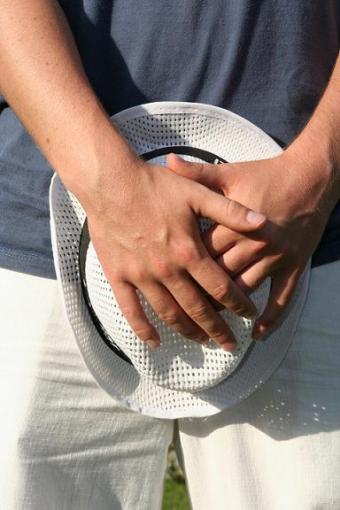
Skin disease of the groin can be embarrassing! It's not a place you can easily scratch when it itches, and having to tell the doctor about a rash there is enough to make anyone squirm.
Common Causes
The most common cause of skin irritations of the groin is a fungus. That might sound pretty awful, but it can happen to anyone. It doesn't mean you're dirty, or that anything is wrong with you.
Many people call this itchy infection "jock itch." Doctors call it "tinea cruris." There are several different fungi that can cause it, but they're all members of a group called dermatophytes. These are fungi that make their home on our skin. Usually they don't cause any symptoms. But they like warm, wet places, and that can include the groin area. If you sweat a lot or wear tight clothing, the dermatophytes can start growing more than usual. The result is a fungal infection.
Who Gets It
Jock itch isn't a problem only for jocks. Athletes are more prone to it, because they sweat frequently, may not always dry off thoroughly, and may wear shorts or athletic supporters that don't get washed often. People who are overweight are susceptible, because they have deep skin folds at the groin. Jock itch is also likely in warm climates, where sweat can be a constant problem.
Symptoms
If you've ever had this problem before, you'll recognize the annoying itch! If it's new for you, here's what to look for:
- Itchiness that doesn't go away when you scratch, or doesn't stay gone
- Reddened skin, usually with a sharp border between the redness and normal skin
- A burning feeling
- Skin that looks flaky or seems to be peeling
- Tiny cracks in the skin, which may be painful
The infection can cover the skin folds at the tops of the thighs, the pubic area, the genitals, and even the buttocks and anus. It may be limited to just one spot, or it may be extensive. If you've never had this rash before, you may want to check with your doctor to make sure you have the right diagnosis.
Treatment
Fungal infection of the groin usually isn't serious, just annoying and embarrassing. In most cases, you can get treatment over the counter at the drugstore. Look for creams, powders, and sprays labeled "anti-fungal." You should find several brands which are labeled for jock itch. Lamisil and Lotrimin are two common ones.
The package will come with specific instructions. Usually, you'll need to apply the medicine to the rash once or twice a day for a few weeks. The itching and burning should get better quickly, but it's a good idea to keep treating for several days even after the rash is gone. You want to make sure the fungus is under control.
When Over-the-Counter Treatment Fails
If medicine from the drugstore doesn't help, your doctor can prescribe something stronger. Prescription-strength antifungal cream is one option. There are also pills you can take by mouth. You doctor may want you to try a cream first, because the pills can occasionally cause liver problems. On the other hand, if your rash is hard to treat and it's driving you crazy, the pills may be your best bet.If jock itch doesn't get better with treatment, or if it keeps coming back, you may have a problem with your immune system. See your doctor for a full check-up and explain what has been happening.
Prevention of Skin Infections
To help prevent dermatophytes from getting out of control, keep your groin area clean and dry. Wash daily with gentle soap. Dry the area thoroughly after bathing and exercise, or any time the area becomes moist from sweat. Wash workout clothes, including athletic supporters, between each wearing. Choose clothing that lets air circulate, including cotton underwear. Avoid tight pants and fabrics that don't breathe.
Other Skin Diseases of the Groin
Every now and then other skin problems, such as eczema, can resemble fungal infections. Again, if the rash doesn't get better, check with a doctor. He or she can do a simple test to make sure that your skin disease of the groin is a simple fungal infection, and not a different disease. Your doctor can also make sure that's it's not a sign of a more serious problem.







